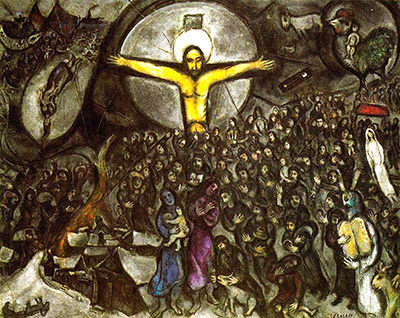Torah: (Bereishit) Genesis 28:10 – 32:3; Haftarah: Hosea 11:7 – 14:10
AND YA'AKOV DEPARTED
The Parashah starts with the words “And Ya'akov departed from Beer-Sheba and went toward Haran,” instead of simply saying Ya'akov went toward Haran. From this the sages inferred that the departure of a righteous person from a place leaves a void. That indeed may be so, but I think that these words can also signify that he departed from his mother and father’s influence and went toward forming his own family (as God commanded in Genesis 2:24), a family who will conceive the twelve patriarchs, later becoming the twelve tribes of Israel. Thus, this Parashah is about Ya'akov's family, the nucleus of the Jewish nation.
And Torah, as to lay the foundation of this new family, starts with a description of a beautiful dream that Ya'akov has of angels ascending and descending from heaven, of which symbolism can be interpreted in many ways. One interpretation is that the earth is full of the glory of God, that God is not far off in His heavenly adobe and heedless of what men do on earth, and that every place on earth may be for man "the gate of heaven." God is accessible from anywhere — it is up to us to open the channel of communications.
But the dreams mentioned in Scripture are usually vehicles of prophecy. Therefore, Ya'akov's dream symbolizes the future of the Jewish people and its ability to connect to God's master plan through the Torah given at Mount Sinai. The ladder alludes to the Mount. The angels, representing Moshe and Aharon, and God standing atop the ladder, give us the image of God standing atop Mount Sinai giving the Torah. This beautiful imagery conveys to us that the Torah given at Sinai and taught by sages, is the bridge from heaven to earth.
Even though Ya'akov's story is about love, faithfulness and dedication, I want to stop and talk about his response to the dream. Not only is it a reflection on Ya'akov's character, but it also has practical applications for us in our quest for a godly living.
Genesis 28:12-22: "And he [Ya'akov] dreamed, and behold a ladder set up on the earth, and the top of it reached to heaven; and behold the angels of God ascending and descending on it. And, behold, the LORD stood above it, and said, "Ani YHVH, I am the LORD, God of Avraham your father, and the God of Yitzchak; the land on which you lie, to you will I give it, and to your seed. And your seed shall be as the dust of the earth, and you shall spread abroad to the west, and to the east, and to the north, and to the south; and in you and in your seed shall all the families of the earth be blessed. And, behold, I am with you, and will keep you in all places where you go, and will bring you back to this land; for I will not leave you, until I have done that about which I have spoken to you." And Ya'akov awoke from his sleep, and he said, "Surely the Lord is in this place; and I knew it not." And he was afraid, and said, "How awesome is this place! this is no other but the house of God, and this is the gate of heaven." And Ya'akov rose up early in the morning, and took the stone that he had put for his pillows, and set it up for a pillar, and poured oil upon its top. And he called the name of that place Beth-El. And Ya'akov vowed a vow, saying, "If God will be with me, and will keep me in this way that I go, and will give me bread to eat, and garment to put on, so that I come back to my father’s house in peace; then shall the Lord be my God. And this stone, which I have set for a pillar, shall be God’s house; and of all that You shall give me I will surely tithe a tenth to You.""
In the dream God is reiterating the promises given to Avraham, to give to his descendants the Land, to multiply exceedingly, to be the father of a multitude of nations and to be a blessing for all the families of the earth. But what is different about this blessing from Avraham's is that God makes a distinction as to Ya'akov's descendants, the Jewish people. To be a blessing for all the families of the earth — and indeed they have been throughout the centuries in science, arts and humanities — and for the “Seed,” i.e. Messiah, to be a spiritual blessing for all the people on earth. God also promises to never leave the Jewish nation until all these promises have been accomplished. At which time all Jewish people would have the Torah written in their hearts and know God personally as prophesied later by the prophet Z’kharyah. The emergence of the State of Israel is sure proof that God is keeping His promise.
But Ya'akov's response to the dream is something that we have to take to heart. His response starts with the word "if." Yet this does not imply doubt that God would keep His word — surely Ya'akov has seen God's promise unraveling in his parents' actions — but rather he feared that he might sin and forfeit God's protection. From the onset his response reveals a humble heart, which is also revealed in his request of the bare necessities for the journey. His prayer was from the heart not from the mental understanding of God, philosophy, or theology.
These words echo rav Shaul's words - which also begin with the word "if" - advising us in our life's journey: "If we have food and covering, with these we shall be content" 1 Timothy 6:8. A tzadik, a righteous person, does not ask and has no need for luxuries because godliness is a means of greater gain when accompanied by contentment (1 Timothy 6:6). And as rabbi Ben Zoma latter wrote in the Pirke Avot: "Who is rich? He who is happy with his lot." Happiness comes from knowing God and His people and doing His work. This is exactly what Ya'akov is promising to do. To give the LORD a permanent place in his heart, and to show this he will continually tithe a tenth from all possessions that God will give him.
One can give without loving, but one cannot love without giving! Giving becomes a natural extension of love. God loved us so much that He gave His one and only Son to die - that we might live. The love of God is beautiful, gracious, holy and merciful. Love that went to such awesome, terrible, and heartbreaking depths to redeem us from our sins must cause an appropriate response from our hearts. If we are truly to become like Yeshua then we will want to be people who love and thereby be people who give. The apostle Yochanan records Yeshua’s answer to the Jewish people who claimed that Avraham was their father, He said to them, "If you are Avraham's children, do the deeds of Avraham." The principle of faith without works being useless, is at work here. For Avraham, who offered up his son Yitzchak on the altar, began by giving to God in the form of the tithe and for this reason he was called "The friend of God.”
Apostle Shaul teaches that faith works through love. If we love Yeshua, then our faith will perform its work. This is the reason God has taught us to tithe continually. Our faith must be tested and thus, strengthen. The Hebrew word for giving is “tzedakah,” but this word also means “righteousness,” which implies that our righteousness is tested in our giving. Do we put our trust in God or do we put our trust in money? Is God the secure Rock of our lives or is our bank account our security in life? In 2 Corinthians, the apostle Shaul uses the example of the assemblies of Macedonia to teach us this principle. These believers, though going through a "great ordeal of affliction," had an even greater joy in knowing Messiah. That even in deep poverty they gave liberally to Yeshua: "For I testify that according to their ability, and beyond their ability they gave of their own accord, begging us with much entreaty for the favor of participation in the support of the saints."
There are some believers who ask, should I be tithing to God when I need new clothes for my children, or when I have unpaid bills, or when I need to pay tuition, rent, buy food or take care that I have enough saved up for my future? That is exactly the challenge to our faith. When we give out of our excess and are still assured that we can afford all the things we need or desire in life, how is our faith challenged? If faith does not need to be placed in God, then one must ask, "If I can't trust God to take care of me in this life and provide for my needs, then how can I have faith that He will save me and grant me entrance into His eternal Kingdom when the time comes." The Macedonians were poor, very poor. It is described in the Scripture as deep poverty, yet they gave beyond their ability and considered it a favor to them. Their faith was working! Their trust was in their Savior because they first gave themselves to Him and their heart was responding to His love.
The tradition of tithing (a tenth) dates before the written Torah was given to Moshe at Mount Sinai — it was a righteous thing to do by righteous people. It was the first act they did as a response to God's abundance provisions. For us giving is an act of worship. It is between us and God. It is a reflection of our trust in Him. If we trust our eternal life in Him, why not trust this earthly life too? That does not mean to test God and give everything we possess, but to be good stewards of the riches He has given us. We can give more than a tenth if God blesses us with more. There are few examples in the Brit Chadashah of sacrificial giving, but a tenth is a good example given throughout the Scriptures.
"’Will man rob God? Yet you have robbed Me. But you say, “How have we robbed You?” In tithes and offerings. You are cursed with a curse; for you have robbed Me, this whole nation. Bring all the tithes to the storehouse, so that there may be food in My house, and test Me now with that,’ says YHVH Tzevaot, the LORD of Hosts, ‘if I will not open for you the windows of heaven, and pour for you an overflowing blessing’" Malachi 3:8.
Tzedakah means righteousness. Every time we bring our tithe we do an act of righteous deed. Just as the righteous Ya'akov was embarking into fulfilling God's plan through the promise of the tithe, and received twelve overflowing blessings — the twelve tribes of Israel, so can we receive overflowing spiritual blessings by contributing to the growth of our local congregations.
Shabbat joy, peace, and blessings! Shabbat Shalom!



